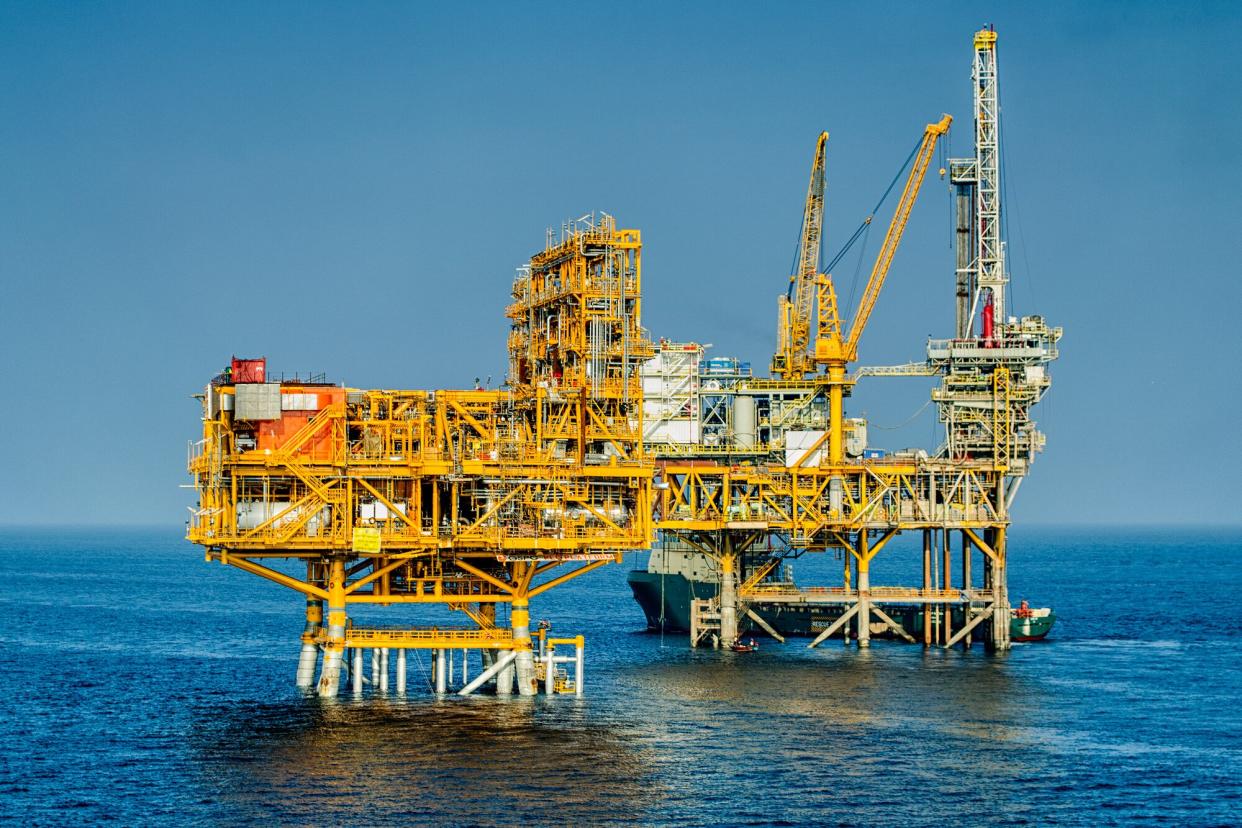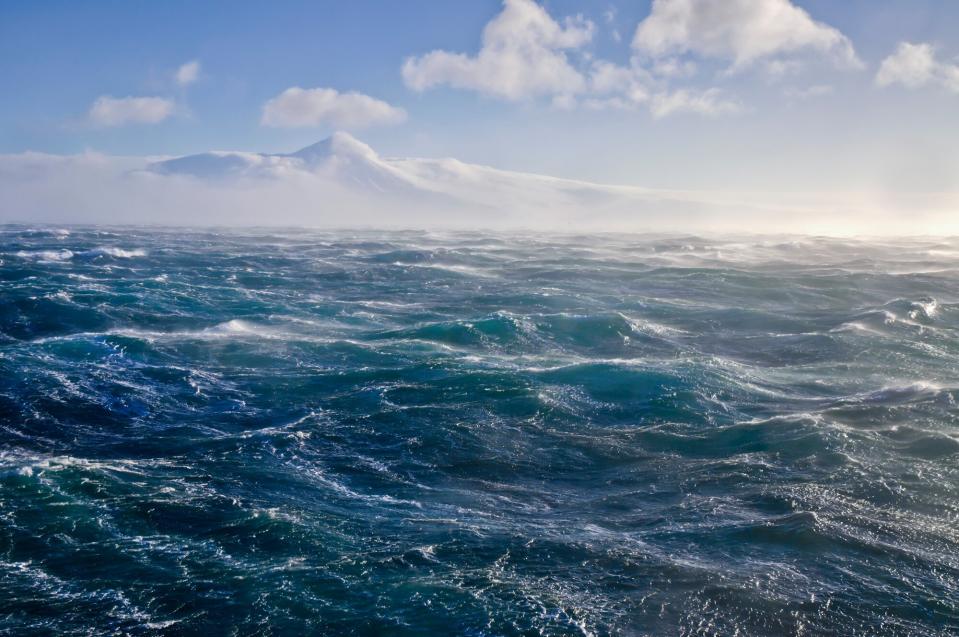Halting New Offshore Drilling Can Keep Planet from Heating to 'Catastrophic Levels,' New Analysis Finds

Getty Offshore drilling platform
Offshore drilling creates dangerous greenhouse gases that are heating up the planet, causing disastrous hurricanes, floods, wildfires, droughts and heat waves. But halting new offshore drilling, and lessening existing production over time, would significantly lower emissions – and keep the planet from warming to "catastrophic levels," says Oceana, the largest international advocacy organization focused solely on ocean conservation.
This week, Oceana released a new analysis ahead of the 2022 UN Climate Change Conference (COP27), the largest annual meeting about the climate crisis, laying out the benefits of halting new offshore oil and gas drilling to reduce global emissions in coming years.
RELATED: Oceans Have Saved Us from the Worst of Climate Change So Far — Now We Must Save the Oceans

Getty
The analysis shows that "stopping the expansion of offshore drilling — combined with the phasedown of existing production driven by reduced fossil fuel demand as clean energy comes online — would deliver up to 13% of the annual greenhouse gas emission reductions needed to prevent the worst effects of the climate crisis," Oceana said in a statement.
"Stopping the expansion of offshore drilling has the potential to reduce emissions more than any other ocean-based solution," Dr. Kathryn Matthews, Chief Scientist at Oceana, one of the authors of the new analysis, Beyond Expectations: Ocean Solutions to Prevent Climate Catastrophe, said in a statement.
Never miss a story — sign up for PEOPLE's free daily newsletter to stay up-to-date on the best of what PEOPLE has to offer, from juicy celebrity news to compelling human interest stories.
"It's irrefutable that the climate crisis is here, now, affecting all of us through more frequent and intense hurricanes, floods, wildfires, droughts, and heat waves," added Matthews.
This report "makes it clear that ocean solutions are climate solutions," she added. "If we're serious about preventing catastrophic climate change, our ocean is a great place to start."
The climate crisis affects us all. Ocean-based solutions can help keep the planet from warming to catastrophic levels, which is why @Oceana is calling on governments at #COP27 to stop new offshore drilling & shift to clean, renewable energy sources. More: https://t.co/K63d57CRwF pic.twitter.com/C50Om69JNV
— Oceana (@oceana) November 3, 2022
Oceans will be a big part of COP27, which takes place this year in the coastal city of Sharm el-Sheikh in Egypt.
From Sunday through Nov. 18, world leaders, climate advocates and more will come together for the 27th Conference of the Parties to the United Nations Framework Convention on Climate Change.
This year's conference "will build on the outcomes of COP26 to deliver action on an array of issues critical to tackling the climate emergency – from urgently reducing greenhouse gas emissions, building resilience and adapting to the inevitable impacts of climate change, to delivering on the commitments to finance climate action in developing countries," the UN said in a statement.
"Faced with a growing energy crisis, record greenhouse gas concentrations, and increasing extreme weather events, COP27 seeks renewed solidarity between countries, to deliver on the landmark Paris Agreement, for people and the planet," the UN said.
❓What needs to happen next to limit global warming to 1.5 degrees?
🎙️ 3 days ahead of #COP27, tune into our latest podcast episode featuring two of the world’s leading experts on climate science and policy.@jrockstrom | @rkyte365 | #ClimateChange— UN Climate Change (@UNFCCC) November 3, 2022
According to the new analysis, adding offshore drilling to the five ocean-based solutions from the 2019 High Level Panel for a Sustainable Ocean Economy report "would take the total ocean contribution to nearly 40% of the emission reductions needed by 2050 to keep the planet from warming a catastrophic 2 degrees Celsius."
The five ocean-based solutions from the report include protecting marine habitats, safeguarding climate-friendly seafood, improving shipping efficiency, replacing fossil fuel power with renewable sources, and improving catch efficiency and fuel use in fishing.
Right now, nearly 30% of all oil and gas production comes from offshore drilling, which generates greenhouse gas emissions throughout the entire process, according to Oceana. And they say that ten countries produce about 64% of all offshore oil and gas: Saudi Arabia, Norway, Qatar, Iran, Brazil, United States, Mexico, United Arab Emirates, United Kingdom, and Angola.
It's also a major contributor to ocean pollution, which wreaks havoc on marine life, coastal ecosystems, and economies with long-lasting effects.
"By stopping the expansion of offshore drilling and promoting clean energy policies...the analysis finds we could reduce emissions by 6.3 billion metric tons a year by 2050," Oceana said, which is equivalent to the annual emissions we would save by removing 1.4 billion cars from the road.
RELATED: Easy Things You Should Do to Help the Planet, from Filling Your Fridge to Raking Your Leaves
"Our oceans have protected us from the worst impacts of climate change by absorbing much of the heat produced by the fossil fuel industry's relentless expansion. But we're now at a tipping point," said Tess Geers, lead report author and Research Director at Oceana.
🌎 "Adapting to climate change must become a global priority."⁰
Long-term investments in adaptation are urgently needed, according to @UNEP's latest #AdaptationGap report— UN Climate Change (@UNFCCC) November 3, 2022
"Life on Earth is inextricably linked to healthy oceans, but without bold and forceful action, a hotter and more acidic ocean will no longer be able to sustain the diversity of life as we know it," added Geers. "Stopping the expansion of offshore drilling is a necessary solution to help ensure our future on this planet. And we know it's possible thanks to the policies being implemented around the world."
In recent years, many governments have enacted policies preventing the expansion of offshore drilling, including Australia, Belize, Costa Rica, Denmark, France, Ireland, New Zealand, Spain, Sweden, and the United States.
"We call on COP27 to recognize how ocean solutions can help us achieve our climate change goals," added James Simon, President at Oceana.
For more information, please visit Oceana.org/ClimateSolutions.

